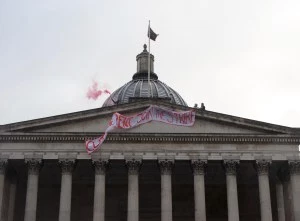Freshers’ week is often billed as the most exciting part of the transition to university; a week of parties, socials, nights out and little to no work.
But with crime rates around London universities among the worst in the UK, newcomers to London face dangers they may not have encountered before.
For one first year student at UCL, these are more than statistics. Within a week of arriving in London, Emily’s* life had been turned upside down by a vicious assault. She said: “Like many other freshers, I had this illusion that whilst London had a history of crime, I was exempt from the threat.”
As she was leaving KOKO, on Camden High Street, where UCL, KCL and LSE all hold freshers’ events, she was violently shoved from behind. The fall dislocated her jaw, and her attackers then kicked and stamped on her, pinning her ankle to stop her from escaping, before taking her valuables.
“I kept being stamped on, which caused bruising to cover the majority of my body,” she recalled. “I was in agony. They mugged me of my iPhone, my money and my debit cards. I was left on the floor like a piece of rubbish.”
She tried to cry for help, but her dislocated jaw made this impossible, and other people at the club, seeing her on the floor, presumed she was just too drunk and had lost her phone. Eventually someone recognised that she was in trouble and called the paramedics, and she was assisted by bouncers until they arrived. Arriving in hospital, she was given morphine and various other drugs, but nothing helped the pain. For eight hours she lay alone, in pain, waiting for surgery.
She explained, “I couldn’t contact my family due to the stolen phone, and was therefore alone, in a new city, in a hospital bed in pure agony. I felt hopeless.”
“I am having panic attacks on a daily basis, particularly if someone walks too close behind me. I barely go out, and I am too embarrassed by my appearance to socialise.”
And it wasn’t just the excruciating physical pain. She was in tears, suffering panic attacks, and was left “utterly traumatised by the gang of men who committed the mugging and assault.”
Though she is now out of hospital, Emily must still wear a neck brace, use crutches due to the injury to her ankle and is in constant pain. But it is the psychological trauma that is hardest to deal with. “I am having panic attacks on a daily basis, particularly if someone walks too close behind me. I barely go out, and I am too embarrassed by my appearance to socialise. I am not sleeping due to nightmares and flashbacks.”
She is also worried about the impact this will have on the degree which she has barely started.
“It feels like my life has been turned upside down,” she said. “I am currently supposed to be studying and completing my degree, and I fear for how this will turn out. It will require so much of myself to complete it.”
Also read: UCL Fresher Attacked On Camden High Street
The Metropolitan Police were unable to formally give out details of any other incidents involving freshers, but Emily’s experience is not thought to be the only one of its kind. “It’s like we’re being targeted because of our vulnerability”, she said, adding that the police officer who took her statement said he was aware of similar crimes.
Camden Borough Councillor John Simpson, Cabinet Member for Community Safety, said that the council would be working with the police to ensure that venues in Camden remain safe and well-managed. The council is responsible for licensing nightclubs, and repeated violent incidents, underage drinking or other criminal activity could lead to the venue being closed.
Councillor Simpson said: “We strive to ensure that all those who come to Camden can do so safely and I’m particularly concerned about this alleged attack on a young student,” adding, “Any violent incident will be fully investigated and the appropriate action taken to deal with it.”
However, KOKO deny that anything happened at all despite the police report Emily filed. The venue instead claims that she lost her phone inside and was taken ill as she left the club, though they were unable to explain the severity of her injuries.
Although Freshers’ Week is over, the darker evenings pose a continued risks to students. In the 12 months to August 2015 (the most recent dates for which figures are available), there were 20,307 robberies reported to the Met police.
The Police also state that 1 in 3 students will fall victim to some sort of crime during their studies; they suggest always travelling home in a group or at least making sure someone knows where you are and when you will be back.
Emily is keen to warn others about the dangers in London, saying: “I am desperate to warn freshers of my ordeal, as I cannot cope with the thought that someone else could end up in my position.
“Please, when you go out, stay in groups and don’t flash your property. It has taken a huge amount out of me to go public with my story, and I don’t want it to go to waste. If you see someone you think is in danger, ask them if they need help. Don’t ever walk past someone passed out on the ground.”
*A pseudonym was used upon request to protect the identity of the individual involved.

2 COMMENTS ON THIS POST To “The darker side of freshers’ nights in London”